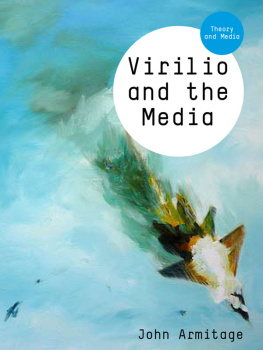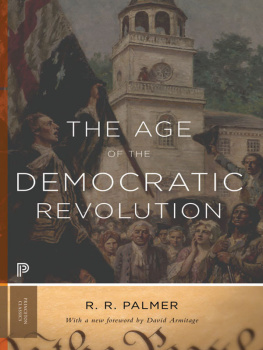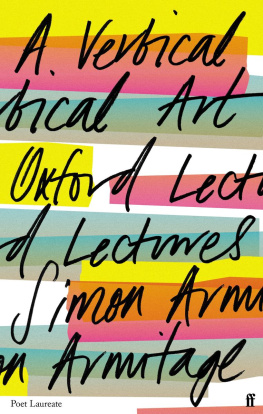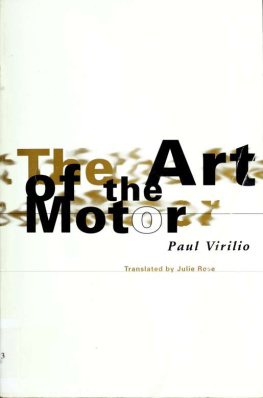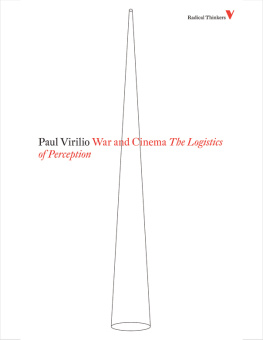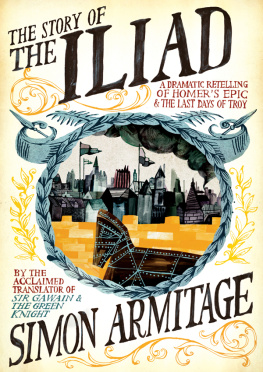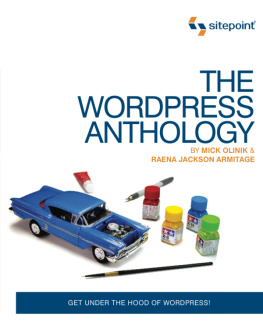Armitage - Virilio and the Media
Here you can read online Armitage - Virilio and the Media full text of the book (entire story) in english for free. Download pdf and epub, get meaning, cover and reviews about this ebook. City: New York;NY, year: 2013, publisher: Polity Press;John Wiley & Sons, genre: Romance novel. Description of the work, (preface) as well as reviews are available. Best literature library LitArk.com created for fans of good reading and offers a wide selection of genres:
Romance novel
Science fiction
Adventure
Detective
Science
History
Home and family
Prose
Art
Politics
Computer
Non-fiction
Religion
Business
Children
Humor
Choose a favorite category and find really read worthwhile books. Enjoy immersion in the world of imagination, feel the emotions of the characters or learn something new for yourself, make an fascinating discovery.
- Book:Virilio and the Media
- Author:
- Publisher:Polity Press;John Wiley & Sons
- Genre:
- Year:2013
- City:New York;NY
- Rating:3 / 5
- Favourites:Add to favourites
- Your mark:
- 60
- 1
- 2
- 3
- 4
- 5
Virilio and the Media: summary, description and annotation
We offer to read an annotation, description, summary or preface (depends on what the author of the book "Virilio and the Media" wrote himself). If you haven't found the necessary information about the book — write in the comments, we will try to find it.
Virilio and the Media — read online for free the complete book (whole text) full work
Below is the text of the book, divided by pages. System saving the place of the last page read, allows you to conveniently read the book "Virilio and the Media" online for free, without having to search again every time where you left off. Put a bookmark, and you can go to the page where you finished reading at any time.
Font size:
Interval:
Bookmark:
VIRILIO AND THE MEDIA
Theory and Media
John Armitage, Virilio and the Media
Paul Taylor, iek and the Media
Geoffrey Winthrop-Young, Kittler and the Media
VIRILIO AND THE MEDIA
JOHN ARMITAGE
polity
Copyright John Armitage 2012
The right of John Armitage to be identified as Author of this Work has been asserted in accordance with the UK Copyright, Designs and Patents Act 1988.
First published in 2012 by Polity Press
Polity Press
65 Bridge Street
Cambridge CB2 1UR, UK
Polity Press
350 Main Street
Malden, MA 02148, USA
All rights reserved. Except for the quotation of short passages for the purpose of criticism and review, no part of this publication may be reproduced, stored in a retrieval system, or transmitted, in any form or by any means, electronic, mechanical, photocopying, recording or otherwise, without the prior permission of the publisher.
ISBN-13: 978-0-7456-6131-5
A catalogue record for this book is available from the British Library.
Typeset in 10.75 on 14 pt Janson Text by Servis Filmsetting Ltd, Stockport, Cheshire
Printed and bound in Great Britain by MPG Books Group Limited, Bodmin, Cornwall
The publisher has used its best endeavours to ensure that the URLs for external websites referred to in this book are correct and active at the time of going to press. However, the publisher has no responsibility for the websites and can make no guarantee that a site will remain live or that the content is or will remain appropriate.
Every effort has been made to trace all copyright holders, but if any have been inadvertently overlooked the publisher will be pleased to include any necessary credits in any subsequent reprint or edition.
For further information on Polity, visit our website: www.politybooks.com
For Jonnne
ACKNOWLEDGMENTS
I am grateful to several people for their supportive contributions to Virilio and the Media: Sean Cubitt, who initially suggested the book; Paul Virilio, who will by now be as astonished as I am that this is the fourth volume that I have produced on his work; Andrea Drugan and Lauren Mulholland, who have been consummate editors, tendering assistance, encouragement, and sensitive guidance during my editorship of Virilio Now: Current Perspectives in Virilio Studies and the writing of Virilio and the Media; and, finally, my good friends at Cultural Politics, above all Ryan Bishop and Douglas Kellner, Mark Featherstone, and the artist Joy Garnett, whose bravura painting adorns the cover of this book. Discussing with me almost daily Virilios ideas concerning the media and much else besides, such splendid companions not only help one to understand the contradictory nature of the world, but also how to cut loose from long-established responses to it.
INTRODUCTION
Paul Virilio (1932) is one of the leading media theorists of the twenty-first century. He is well known for his innovative studies of the aesthetics of disappearance, which will establish the chief focal point of Virilio and the Media and will be explained in detail shortly. The aesthetics of disappearance is the core of his 1980 book of the same title (Virilio 2009a), which is increasingly debated by media theorists and is widely regarded as an important text for undergraduate and postgraduate programs in the visual arts, cinema and new media, cultural and political geography, and museum studies. It is the primary text of his aesthetic theory and has become progressively more influential since its first edition. In a virtuoso sequence of four concise parts, he examines perception and speed, politics, society, the convulsive state of human consciousness, subjectivity, and absence.
This book will be the topic of concern with war, vision, and urban terrorism and provoke stimulating questions for anyone studying the contemporary arts and humanities, social sciences, and philosophy. The aim of Virilio and the Media is to familiarize readers with a range of Virilios decisive critical investigations into todays media world and to clarify his aesthetics and philosophy of disappearance.
Important questions about art and technology, aesthetics, and disappearance are situated at the heart of Virilios work on the media. And, whether he is writing about a masterpiece of cinema, a military text, logistics, or human perception, he constantly focuses upon the significant artistic and technological concerns that his subject calls to mind. Virilio is, first and foremost, a critic of art and a philosopher of technology involved with how our ways of life are arranged and managed by the cultures we live in, and his examination of everythingfrom new media and vision to inertia, the mobile phone, and accidentsplays a part in this critical appreciation. His persistent contestation of traditional ideas about the city and about panic, violence, territory, and televised media events makes his work frequently worrying and complex, but simultaneously exhilarating and affecting.
While Virilio does not continually employ his own concept, a great deal of his writing on the media concentrates on questions emerging from what he terms the aesthetics of disappearance. The idea of an aesthetics of disappearance has attained a somewhat fashionableif fatalisticreputation lately. It is regularly associated with the work of the late French media theorist Jean Baudrillard (19292007)for example with a contemporary cultural world from which human beings have disappeared and with the dismissal of arguments for their natural exhaustion, extinction, or even extermination (2009: 910). Commentators on the aesthetics of disappearance who focus on the exhaustion of natural resources or on the extinction of species are often criticized for their conviction that in current media theory the question of the aesthetics of disappearance has to do with physical processes or natural phenomena. Thus the argument that Baudrillard (2009: 10) produces is based on the notion that the human species is the only one to have invented a specific mode of disappearance that has nothing to do with Natures law, and that the aim of media theory is merely to explore and take pleasure in an emergent art of disappearance. Baudrillards account of the aesthetics of disappearance is very different from Virilios philosophical perspective. Similarly, Baudrillards suggestion that, in the era of the aesthetics of disappearance, the human species has been appropriated by the disappearance of the real and by the murder of reality in the age of the media, virtual reality, and networks is a proposal that Virilio acknowledges but resists throughout his work. For, even if he concedes that the human species has created forms of disappearance beyond the laws of nature, his writings on the media continuously take up the issue of what it might mean to theorize and act ethically without the existence of the human species, its art, or even reality itself. Virilio does not simply recoil in misery at humanitys decision to transform the real world in the modern age through technoscience; nor does he rejoice at the defeat of pre-technoscientific analysis or knowledge, notwithstanding the relentless implementation of technoscientific inventions. Instead he steadfastly looks for novel ways of examining the aesthetic realms of technoscientific devices and their cultures in order to determine alternative trajectories for media theory and practice, which will transform these and our own worlds into something more human and caring. Hence, for Virilio, the most important work of a philosopher of aesthetics is to challenge, with equal force, both the sliding of human beings into a phase of technologically induced disappearance and the overwhelming strength of those modes of disappearance that lie outside of Natures law. These are all difficult conceptions, but each and every one will be presented straightforwardly and in depth in subsequent chapters.
Next pageFont size:
Interval:
Bookmark:
Similar books «Virilio and the Media»
Look at similar books to Virilio and the Media. We have selected literature similar in name and meaning in the hope of providing readers with more options to find new, interesting, not yet read works.
Discussion, reviews of the book Virilio and the Media and just readers' own opinions. Leave your comments, write what you think about the work, its meaning or the main characters. Specify what exactly you liked and what you didn't like, and why you think so.

